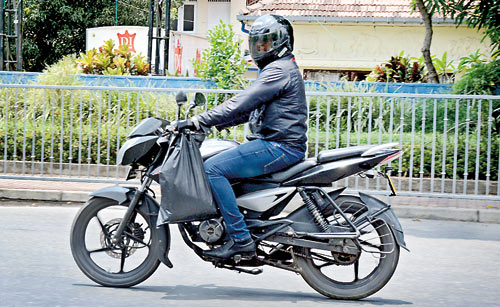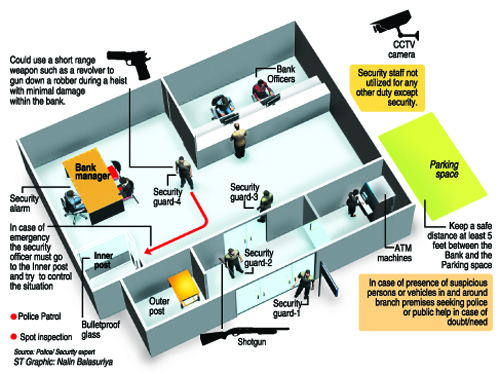News
Helmets suffer collateral damage in deadly game of cops and robbers
While nearly three million motorbike riders await a court ruling on the challenge to the full face helmet ban, former law enforcement figures and security firms say illicit small arms must be taken off the streets and out of the hands of criminal gangs to prevent gun-related crimes.
A survey by a national commission between November 2006 and April 2007, found that 300,000 guns are in the hands of civilians. But that was before the war ended.

Nearly three million motorbike riders await a court ruling on the challenge to the full face helmet ban
As far as legislation is concerned, critics say the Amended Firearms Ordinance No 22 of 1996 is obsolete.
Police data show there were 125 offences under the Offensive Weapons Act in 2013. There were no convictions. The same year, there were 33 cases of possession of automatic or repeater shot guns. No convictions. And out of 4,718 robberies recorded, there were just 251 convictions.
Even policemen have been gunned down by criminal gangs.
Critics of the full face helmet ban also question the failures of vulnerable businesses such as banks and jewellers to protect their establishments.
Security firms agree prohibiting full face helmets is no solution to preventing crimes. There are more than 400 security firms registered under the Defence Ministry.
The challenge to the helmet ban moved up a notch following a massive demonstration by motorbike riders at Galle Face Green last Sunday. On the same day, a petition was filed with the Human Rights Commission by two consumer protection groups who argue that consumer rights are being violated.
Last Thursday, the Court Appeal granted interim relief, suspending the police ban against full face helmets until April 28. The bench comprising Justices Vijith K. Malalgoda and H.C.J. Madawala considered two petitions.
The Minister for Public Order John Amaratunga said he will await the court ruling.
Former traffic Deputy Inspector General of Police T. Perinpanayagam insists that the police should follow motor traffic regulations and not enforce the ban.
He also pointed out that the police have no right to enforce the ban unless empowered by a gazette notice.
Illegal firearms and ammunition must be taken out of circulation, he said.
He suspects that most gun-related crimes are committed by an estimated 41,000 military deserters.
Police can use motor traffic regulations to ban or punish users of helmets with tinted visors in open face and full face helmets as well as vehicle owners using tinted windows, he said.
An expert at a leading security solutions firm said security personnel of his company will undergo advanced training to counter armed threats.
“In the case of full face helmets, it is a serious threat to the security of a financial organization, but we cannot treat customers as law breakers. We have to be more vigilant. Banning full face helmets can never be the solution to eradicating crime,’’ he said.
 Some of the firm’s clients do not favour armed guards on their premises, he said. That sends the wrong message to customers.
Some of the firm’s clients do not favour armed guards on their premises, he said. That sends the wrong message to customers.
“The police have to identify the root causes of this issue and track illegal firearms and organized criminal groups,’’ he said.
A former deputy inspector general of police at the Criminal Investigation Department said that during his tenure such a ban was not imposed even during the war. Intelligence was used instead.
He suggested that businesses in urban and rural areas form associations and increase vigilance over possible threats to security.
A security officer of a financial institution said banks and financial institutions are covered by insurance, but security firms bear responsibility for the lives of staff, clients, and guards. People could be fatally hurt in crossfire when security personnel engage an armed robber. “Then we have to suffer the consequences,’’ he said.
Surveys by global agencies have also shown there is little control over private security firms in Sri Lanka. Some employees of these firms are suspected of hiring out their guns to criminals.
| Helmets tussle pits rights against the law In their petition to the Court of Appeal challenging the police ban on full face helmets, two motorbike riders argued that under the Motor Traffic (Approved Protective Helmets) Regulations 1990, full face helmets are not prohibited and they provide additonal protection to the head from the eyebrow to the chin. They cited regulations issued in 1991 under the Motor Traffic Act, under which helmets must allow easy identification of the rider and would not “obscure, conceal or distort any portion of the face between the eyebrow and the chin.” Meanwhile, the Consumer Rights Protection National Organization filed a consumer rights violation complaint with the Human Rights Commission of Sri Lanka. President of the consumer rights body, Ranjith Pushpakumara, said that the 1991 law on helmets does not prohibit headgear covering the area from the eyebrow to the chin, but, now, 25 years later, police are reversing course. He said most motorbike riders can not afford the new standardized helmets introduced by the police because many hail from poor and middle class backgrounds. “Every rider has a legal right to protect himself from external dangers. This is a violation under the consumer affairs law,” the consumer rights body told the commission. |

